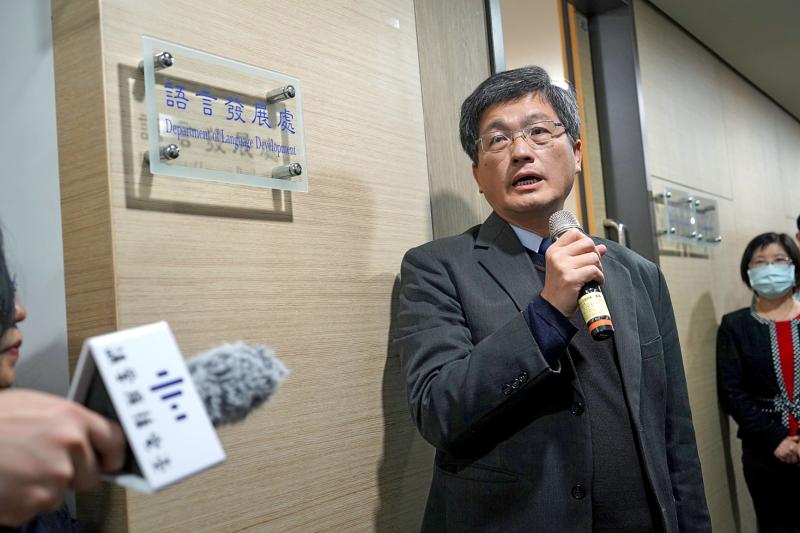The Hakka Affairs Council on Tuesday said it has restructured its organization to create a new Department of Language Development dedicated to promoting the Hakka language.
The promotion and revival of Hakka language and culture is central to the council’s mission, Hakka Affairs Council Minister Yiong Con-ziin (楊長鎮) said.
The Language Education Section of the council’s Department of Culture and Education was previously responsible for the job of promoting the Hakka language, he said.

Photo courtesy of the Hakka Affairs Council
Last year, the council sought approval from the Executive Yuan to adjust and expand the section, he said.
The Department of Culture and Education has been transformed into the Department of Language Development, the council said.
The Culture and Arts Section of the former Department of Culture and Education has been merged with the Department of Communication Marketing to create the Department of Arts, Culture and Communication, the council said, adding that it would formulate a marketing strategy for Hakka arts and cultural activities.
The Department of Language Development is to encourage the use of the Hakka language in schools, families and communities, it said.
The department would have sections focused on planning, education and society, Yiong said.
It hopes to improve pertinent infrastructure, develop Hakka-language environments, enrich the Hakka content industry and support community-based arts and cultural activities, he said.
The department’s primary task is to create environments that are friendly to the use of the Hakka language and to increase its use, he said.
While the Hakka Basic Act (客家基本法) and the Regulations for Implementation of the Hakka Language as the Common Language (客語為通行語實施辦法) require a percentage of civil servants and teachers who work in areas where Hakka is a common language to pass a Hakka proficiency test, obtaining the certification does not mean that Hakka is freely used locally, he said.
Thus, the council would ramp up its promotion of the language among the public, he said, adding that he looks forward to local communities becoming important places for the revival of the language.
The development of Hakka arts and culture would also focus more on local communities, he said, adding that the council aims to help boost the arts and cultural scene in Hakka communities.

Taiwan has received more than US$70 million in royalties as of the end of last year from developing the F-16V jet as countries worldwide purchase or upgrade to this popular model, government and military officials said on Saturday. Taiwan funded the development of the F-16V jet and ended up the sole investor as other countries withdrew from the program. Now the F-16V is increasingly popular and countries must pay Taiwan a percentage in royalties when they purchase new F-16V aircraft or upgrade older F-16 models. The next five years are expected to be the peak for these royalties, with Taiwan potentially earning

STAY IN YOUR LANE: As the US and Israel attack Iran, the ministry has warned China not to overstep by including Taiwanese citizens in its evacuation orders The Ministry of Foreign Affairs (MOFA) yesterday rebuked a statement by China’s embassy in Israel that it would evacuate Taiwanese holders of Chinese travel documents from Israel amid the latter’s escalating conflict with Iran. Tensions have risen across the Middle East in the wake of US and Israeli airstrikes on Iran beginning Saturday. China subsequently issued an evacuation notice for its citizens. In a news release, the Chinese embassy in Israel said holders of “Taiwan compatriot permits (台胞證)” issued to Taiwanese nationals by Chinese authorities for travel to China — could register for evacuation to Egypt. In Taipei, the ministry yesterday said Taiwan

‘LIKE-MINDED PARTNER’: Tako van Popta said it would be inappropriate to delay signing the deal with Taiwan because of China, adding he would promote the issue Canadian senators have stressed Taiwan’s importance for international trade and expressed enthusiasm for ensuring the Taiwan-Canada trade cooperation framework agreement is implemented this year. Representative to Canada Harry Tseng (曾厚仁) in an interview with the Central News Agency (CNA) said he was increasingly uneasy about Ottawa’s delays in signing the agreement, especially as Ottawa has warmed toward Beijing. There are “no negotiations left. Not only [is it] initialed, we have three versions of the text ready: English, French and Mandarin,” Tseng said. “That tells you how close we are to the final signature.” Tseng said that he hoped Canadian Prime Minister Mark Carney

POSITIVE DEVELOPMENT: Japan and the US are expected to hold in-depth discussions on Taiwan-related issues during the meeting next month, Japanese sources said The holding of a Japan-US leaders’ meeting ahead of US President Donald Trump’s visit to China is positive news for Taiwan, former Japan-Taiwan Exchange Association representative Hiroyasu Izumi said yesterday. After the Liberal Democratic Party’s landslide victory in Japan’s House of Representatives election, Japanese Prime Minister Sanae Takaichi is scheduled to visit the US next month, where she is to meet with Trump ahead of the US president’s planned visit to China from March 31 to April 2 for a meeting with Chinese President Xi Jinping (習近平). Japan and the US are expected to hold in-depth discussions on Taiwan-related issues during the